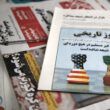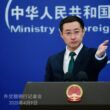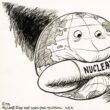Political forest, technical trees
By Suvrat Raju, September 10, 2015
In Round Two, my colleague Akira Kawasaki discussed the Fukushima disaster and its implications for nuclear weapons, while Mustafa Kibaroglu delved into Japan's stockpiles of plutonium. Both authors made important points about the technical and humanitarian aspects of nuclear safety and security. But it's important not to lose sight of the central political question that the bombings of Hiroshima and Nagasaki present: What sort of political system allowed the US government to commit terrorist acts and then enabled the leaders responsible to escape both domestic and international consequences?
The arms control community has largely steered clear of such questions. This is not to suggest that the technical issues it addresses instead are unimportant. Kibaroglu, for example, reminds us through his discussion of Japanese plutonium that civilian nuclear industries automatically increase proliferation risk. Policy makers use this ambiguity to their advantage. As early as 1955, the first chairperson of India's atomic energy commission, Homi Bhabha, admitted that the “atomic power industry … will put into the hands of many nations quantities of fissile material from which … atomic bombs will be … [an] easy step.” Sure enough, India's atomic energy program provided a basis for nuclear weapons. Currently, India is preparing to operationalize a prototype fast breeder reactor that is advertised as a 500-megawatt power reactor, but which has been kept out of international safeguards and may be used to generate as much as 140 kilograms of weapons-grade plutonium each year.
Kawasaki, meanwhile, is correct that the Fukushima accident highlights the peacetime dangers posed both by power reactors and by nuclear weapons. The nuclear industry uses the term “defense in depth” to describe the redundant safety systems that protect reactors. But sometimes a single unforeseen event can simultaneously affect multiple system elements; for example, at Fukushima, 12 of 13 back-up diesel generators were disabled by the tsunami. So skepticism is justified when governments use precisely the same buzzwords to suggest that their control over nuclear arsenals is perfectly reliable. And nuclear weapons may also be vulnerable to Strangelovian scenarios, in which an insider deliberately engineers a disaster. The Germanwings crash of March 2015—in which a copilot steered his aircraft into the French Alps while using the plane's own security systems to keep the pilot locked out of the cockpit—was a chilling example of just such an event.
Challenge and reform. While it is necessary to improve nuclear safety and security, we must not forget that the bombings of Hiroshima and Nagasaki were conscious political decisions. And despite the horror of the bombings, the US government has repeatedly considered taking similar actions again.
In 1969, Henry Kissinger wrote a memo to Richard Nixon that outlined possible plans of attack against North Vietnam. The memo emphasized not only that “the action must be brutal,” but also that “[i]t must … be based on a firm resolve to do whatever is necessary to achieve success.” This memo was accompanied by a list of “important questions,” including: “Should we be prepared to use nuclear weapons?” More recently, in 2006, investigative journalist Seymour Hersh reported that the Bush administration had considered using tactical nuclear weapons against Iran.
The US government didn't carry out nuclear attacks in either case, but such incidents must be viewed within the proper historical context—namely, that the US military has repeatedly used non-nuclear terror tactics. In 2004, for example, faced with resistance in the Iraqi city of Fallujah, US forces besieged the city and attacked it with white phosphorus—an incendiary chemical—seizing Fallujah General Hospital and causing a large fraction of the city's population to flee in terror.
Events like this reveal a political system in which those who wield power are fundamentally detached from the human consequences of their actions. In the United States, the powerful are insulated from domestic political consequences by internal propaganda that paints their actions as necessary and just—or, at the least, basically well intentioned.
It is in this realm that public intellectuals—by vigorously confronting such false claims—can play an important role. True, fulfilling this function requires academics to move beyond their traditionally defined disciplines and negotiate terrain that is inherently political rather than technical. But only by fundamentally challenging and reforming the system that enabled Hiroshima and Nagasaki can we hope to rid the world of nuclear weapons.
Topics: Nuclear Energy, Nuclear Weapons
Share: [addthis tool="addthis_inline_share_toolbox"]














